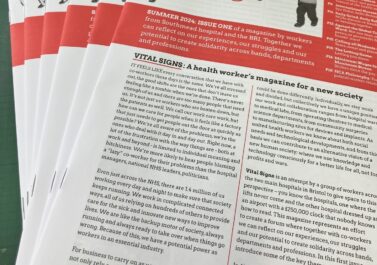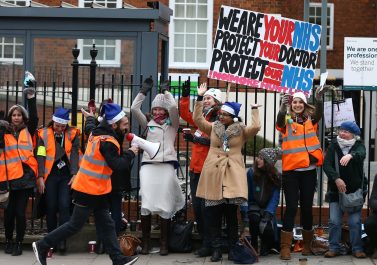We invited comrades involved in university struggle in New York (mobilisation at CUNY and by GSOC-UAW 2110, New York University), Delhi (Citynotes), Edinburgh (Staff Solidarity Network at Edinburgh University) and London (Goldsmith Workers’ Action) to talk about their experiences and views on university struggles as class struggle.
Find a recording of the debate here: https://soundcloud.com/user-115603217/audio-only
A comrade sent us an interesting paper on ‘education and class struggle’ afterwards, you can find it here:
We introduced the debate with some ideas about six different channels through which university struggles tend to or might spread into the wider working class. These channels interact with each other and due to wider social changes become less or more significant.
1) Struggle in the university as part of the public sector
Many universities end employment contracts are still formally subsumed to the public sector. Here the connection between university and the wider class is given through this formal commonality and the fact that public sector trade unions also organise university workers. With the privatisation the significance of this link is diminishing and the dependence on mainstream unions make it a potentially weak link.
2) Struggle against the university as capitalist enterprise inspiring other workers
This becomes increasingly important, but although there are similar problems (wages, casualisation etc.) the specific work process and social separation of universities will make it more difficult for other workers to identify with and practically relate to the struggles there.
3) As collaborators/struggling workers in the social production process
Many university departments cooperate practically with private businesses or the wider science, military and tech sector. While well documented and criticised/scandalised as the subsumtion of ‘learning’ to profits, the actual cooperation is rarely analysed in detail and potentials for the expansion of university struggles beyond its boundaries are under-explored.
4) Students as student workers
Although we can say that we have probably seen a ‘peak student’ when it comes to working class participation in higher education we can see that many students work normal jobs during the time they study. While these jobs are often confined to classic ‘student jobs’ (libraries, hospitality etc.), we also find that many of our work-mates in warehouses and delivery companies are part-time students. Subversive feedback loops are possible.
5) Campus struggles form students who end up as skilled workers
We see an increasing discontent amongst so-called ‘tech workers’ (Google, Amazon), many of whom have had higher education and might have been politicised during their time on campus. We have to understand better why most university struggles are led by ‘social science students’, is it because they see the university as a potential employer, is it because ‘organising struggles’ is seen as educational itself? The connection between technical students and struggles of technical workers is important in order to understand how we can break down the wider division of intellectual and manual labour.
6) Campus struggles produce ‘political subjects’ who relate to the class as such
Life on campus and the space to debate fosters a politicisation of students. Historically they have related to workers primarily as ‘political subjects’, often as allies in a limited sense. In recent decades we have seen two contradicting tendencies: a) the growing influence of post-modern politics on campus which creates a wider gap between university and working class and b) an increaing ‘proletarianisation’ of students on the other hand, which materially narrows this gap.
Issues raised in the discussion:
– role of the larger unions within higher university struggles, opportunities and limitations, how to work within, outside and around them.
– different strategies to struggle in light of changes within and to the university (radical caucuses, campaigns against outsourcing, (wildcat) marking boycotts, bulletins/forums of exchange)
– divisions amongst the university workforce and different groups of students (STEM students and liberal arts) and how to overcome them
– politicisations paths within the university and who is involved, scope for questioning wider changes to privatisation of education rather than merely defensive campaigns against certain cuts
– university’s changing position in relation to their role as landowners, finance, private business partnerships
– a critical reflection of UCU strikes in the UK; campaigns in Baltimore against the use of private police; role of students in wider social movements in Greece
– the role of the university within the social production process (breeding ground for new disciplining techniques, use of production techniques like ‘speed up’ in ‘intellectual’ sphere, role in knowledge production, reproduction of divide between manual and intellectual labour, are workers students, or students workers?)


